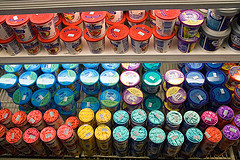Greek Yogurt: Thick And Luxurious, Or Just Full Of Milk Powder?
 Americans are crazy for Greek yogurt. Thicker than the yogurts we’re used to, the dairy treats come in pre-flavored and unflavored versions, and it seems like every dairy brand and grocery chain has their own version. Not all Greek yogurts are made in the same way, though. The normal method is to make yogurt, then strain the additional liquid whey, producing a denser product. This results in a product with about twice the protein of regular yogurt, but less calcium. That’s what most consumers probably picture when they pick up a container of Greek yogurt off the shelf. The huge demand for the products means that some manufacturers are finding other ways to get that thick texture and high protein content.
Americans are crazy for Greek yogurt. Thicker than the yogurts we’re used to, the dairy treats come in pre-flavored and unflavored versions, and it seems like every dairy brand and grocery chain has their own version. Not all Greek yogurts are made in the same way, though. The normal method is to make yogurt, then strain the additional liquid whey, producing a denser product. This results in a product with about twice the protein of regular yogurt, but less calcium. That’s what most consumers probably picture when they pick up a container of Greek yogurt off the shelf. The huge demand for the products means that some manufacturers are finding other ways to get that thick texture and high protein content.
For example, some companies just add more milk protein concentrate to the mix instead of making and straining a batch of regular old yogurt. According to the Toronto Globe and Mail, Canadian brand Liberté uses this method to manufacture their Greek yogurt. They explain the product on the company web page as follows:
A yogurt strained according to the principles of old-time cheesecloth draining, which gives it an incredibly rich and creamy texture and one that’s absolutely free of fat.
So they use the “principles of old-time cheesecloth draining,” but don’t double-strain their yogurt. Gotcha. Liberté is now part of General Mills. Some annoyed yogurt-lovers filed a class-action suit against the company, alleging that the use of milk protein concentrate in its Yoplait brand Greek yogurts isn’t just misleading to consumers, but means that Greek yogurt products shouldn’t legally be permitted to call themselves “yogurt.”
The lawsuit claims that milk protein concentrate isn’t listed as one of the ingredients that the FDA allows in something that’s called “yogurt.” General Mills counters that it’s not specifically prohibited, and there are no FDA regulations for which yogurts can or can’t call themselves “Greek.”
The FDA regulations, written in 1981 and last revised in 1993, list permitted products in yogurt in unappetizing detail:
(d)Other optional ingredients. (1) Concentrated skim milk, nonfat dry milk, buttermilk, whey, lactose, lactalbumins, lactoglobulins, or whey modified by partial or complete removal of lactose and/or minerals, to increase the nonfat solids content of the food: Provided, That the ratio of protein to total nonfat solids of the food, and the protein efficiency ratio of all protein present shall not be decreased as a result of adding such ingredients.
General Mills has asked that the lawsuit be thrown out, but their new Greek yogurt offering in the Yoplait line doesn’t appear to include milk protein concentrate.
Sweet on Greek yogurt? Here’s the skinny [Globe and Mail]
General Mills sued over whether Yoplait Greek yogurt is yogurt [Star-Tribune]
Want more consumer news? Visit our parent organization, Consumer Reports, for the latest on scams, recalls, and other consumer issues.

